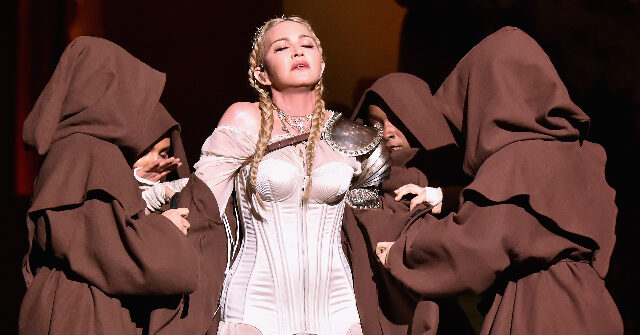Pop icon Madonna, at 66 years old, stirred controversy over the weekend by posting AI-generated images that depicted Pope Francis in a compromising and intimate pose with her on her Instagram Story. The image, which suggested a playful and provocative interaction between the two figures, elicited swift backlash from fans and followers who deemed the photos inappropriate and disrespectful. Madonna captioned the image with “Feels good to be seen,” further igniting criticism about the lack of sensitivity towards the religious figure and the wider community that he represents. The overtly suggestive nature of the imagery has drawn ire, reminding many of to recent instances of Madonna’s provocative art.
The strong reactions to Madonna’s post reflect broader concerns regarding celebrity culture and the responsibilities that come with it. Social media users expressed their discomfort and disapproval, with comments highlighting how the images were “ridiculously disrespectful” and “creepy.” Such reactions signal a cultural clash between Madonna’s individualistic expression of artistry and the traditional values upheld by many within the Catholic community. The Pope, as a religious leader, is seen as a figure of morality and sanctity, making the intertwining of his image with Madonna—a figure known for her provocative public persona—particularly jarring for some.
This was not the first time Madonna faced backlash concerning her relationship with the Catholic Church. In a Vanity Fair photoshoot just over a year ago, she famously mocked Leonardo da Vinci’s Last Supper, drawing sharp criticism from religious sectors. During that period, Madonna portrayed herself as a victim of criticism from the Church, asserting that her artistic endeavors were meant to foster understanding and promote freedom of expression. She claimed that the Church’s response to her work proved their inability to grasp the intentions behind her artistry, suggesting that her creative processes were aligned with the unifying messages of Jesus Christ’s teachings.
Further adding to her controversial public persona, Madonna was also in the news recently for a post that featured her eating a cake with the phrase “Fuck Trump” written on it. This post came shortly after the election where her party’s candidate, Kamala Harris, lost to Donald Trump. In the accompanying text, Madonna expressed her disbelief at the electoral outcome, questioning why a convicted felon with a controversial history was chosen to lead the country, underscoring her frustration with the current political landscape. Madonna’s continued provocations tie into a larger narrative of celebrity engagement within political discourse, reflecting how public figures often leverage their platform to voice strong opinions.
Madonna’s actions seem to reflect a longstanding pattern of using shocking imagery and statements to garner attention and provoke reactions. While some laud her for challenging norms and pushing boundaries, others view her approach as needlessly provocative and insensitive, particularly when involving significant religious figures. This tension emphasizes an ongoing debate surrounding artistic freedom versus respect for tradition and belief systems. The polarizing nature of her work and statements illustrates the complexity of artistic expression in an age of social media where rapid responses can quickly amplify sentiments, both positive and negative.
In summary, Madonna’s recent Instagram post featuring AI-generated images of Pope Francis has reignited discussions about artistic license, respect for religious figures, and the role of celebrity in socio-political commentary. Her history of provocative artistic endeavors, including previous criticisms from the Catholic Church and politically charged statements, highlights the delicate balance between freedom of expression and public responsibility. As a result, her actions continue to evoke strong reactions, demonstrating the intersections of celebrity culture, artistry, and societal values in modern discourse.

